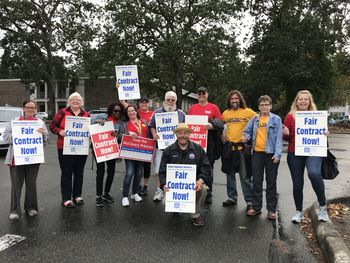ESP locals making gains with old-fashioned union organizing

Teachers and other certificated educators weren’t the only ones making big strides in bargaining this year.
As examples, Bainbridge Island ESPA won an 18.2 percent wage hike this year, with top pay reaching $51.91 an hour. Wages for Elma ESP jumped $3.35 an hour, a gain of 11.6 percent to 29.1 percent depending on the previous pay schedule. Salaries increased for Mercer Island CPEA by 16.2 percent; for North River ESP, 15; Omak Secretaries, 12.5; Shoreline ESPA, 19.7 with top pay of $41.44 per hour; Spokane Educational Support Specialists’ top pay hit $44.63 an hour, with 10 percent raises for techs, 14.5 percent for laborers, 12.8 percent for paraeducators; and, in Tacoma, Office Professionals saw a 19 percent jump, while Professional-Technical employees won 14 percent and a top wage of $62.22 an hour.
In many locals, those gains were perhaps even more challenging than for certificated staff, since administrators too often treat support employees as an afterthought.
In WEA’s Soundview UniServ Council, near Tacoma, ESP members make up 43 percent of the council’s membership. To make gains there, leaders recognized they would have to change the minds of not just the administrators in Clover Park, Steilacoom and University Place districts, but among our own members as well. Each of the locals turned to good old-fashioned union organizing to bring change. The result was a textbook example of how hope and hard work can be combined to achieve success.
Soundview’s locals began by making workplace conversations the norm, with 10-minute building meetings, and one-on-one conversations between members, building reps and elected leaders. The council shared information on WEA members’ success in increasing state funding, how much would be available in each district, and how little administrators were pledging to spend on wage increases for support staff. The locals and council coordinated multiple events, including training for leaders, after work get-togethers, a Sparks training each June specifically for ESP members, and home visits in July to 90 percent of the council’s 1,000+ ESP members.
The successful strategy replaced fear with hope, and helped shift members’ mindsets from an attitude of helpful assistants to powerful advocates for their own worth as employees and their demand for fair compensation.
The gatherings included a mix of information on likely attacks by anti-union, anti-school funding groups such as the Freedom Foundation, concepts around unionism as a two-way relationship with members needing the union to thrive, and the union needing the united action of its members to make gains. The districts also participated in organizing, indirectly, with continued reminders that administrators would find time to bargain with teachers, but just couldn’t fit support staff into their busy schedules.
Soundview’s locals responded by escalating, including informational pickets attended by hundreds of members, alliances with supportive power brokers including teachers and other labor unions in the community, school board protests and, eventually, members’ calls to their superintendent’s direct line to keep up the pressure.
This story appears in the new issue of WE 2.0.